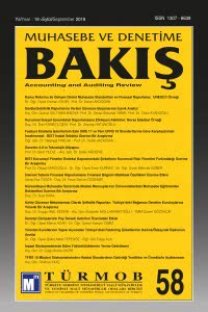BAĞIMLI VE BAĞIMSIZ MUHASEBECİLERİN MESLEK ETİĞİ ALGILAMA DÜZEYLERİNE İLİŞKİN BİR ARAŞTIRMA
Bağımsız muhasebeci, bağımlı muhasebeci, meslek etiği, etik kurallar
A RESEARCH ON PERCEPTION LEVEL OF PROFESSIONAL ETHICS BY DEPENDENT AND IN- DEPENDENT ACCOUNTANTS
___
- AKDOĞAN, N. ve SEVİLENGÜL, O. (1998), Tekdüzen Muhasebe Uygulaması, İSMMMO Yayınları, No.7, -İstanbul.
- AYMANKUY,Y. ve SARIOĞLAN M.;(2005) “Muhasebe Meslek Mensuplarının Meslek Etiğine Yaklaşımları”, Balıkesir Sosyal Bilimler Enstitüsü Dergisi, Cilt:8, S:14, ss:23-45.
- BRIEN, A., (1998), “Professional Ethics and The Culture of Trust”,Journal of Business Ethics, V: 17, pp: 392- 395
- COHEN, J. R. , PANT, L. W. and SHARP, D. J. (2001), “An Examination of Differences in Ethical Decision – Making Between Canadian Business Students and Accounting Professionals,” Journal of Business Ethics, V: 30, N: 4, pp: 319-336.
- ÇİFTÇİ, Y. ve ÇİFTÇİ B. (2003), “Muhasebe Mesleğinde Meslek Etiği (Türkiye’deki Düzenlemeler ve Uluslararası Düzenlemelerle Karşılaştırılması), Muhasebe ve Denetime Bakış, Sayı: 10, ss: 79-96.
- DOBSON, J. (2002), “Three Business Contexts: From the Technical and Moral, to the Aesthetic”, Electronic Journal of Business, V:12, N: 2.
- GÜL, K. ve ERGÜN H. (2004), “Muhasebe Mesleğinde Etik” Muhasebe ve Denetime Bakış, Yıl: 4, S: 11. ss: 53- 77.
- JEFFREY, C. (1993). “Ethical development of accounting students, non-accounting business students, and liberal arts students”, Issues in Accounting Education V: 8, pp: 8-31.
- JOHNSON, R.A. and WICHERN, D.W. (2002), Applied Multivariate Statistical Analysis. Prentice-Hall Inc.
- JOSEPHSON, M. (1995), Teaching Ethical Decision Making and Principled Reasoning,, Business Ethics Readings and Cases in Corporate Morality, Ed. W. Michael Hoffman ve Robert E. Frederick, 3. Baskı, Mc Graw Hill, New York,
- KIREL, Ç. (2000), Örgütlerde Etik Davranışlar, Yönetimi ve Bir Uygulama Çalışması, AÜ Yayınları, Eskişehir.
- KUÇURADİ, İ. (1997), “Uludağ Konuşmaları, Özgürlük, Ahlâk, Kültür Kavramları”, Türkiye Felsefi Kurumu Yayınları, Ankara.
- KUÇURADİ, İ. (1999a) “Etik”, Türkiye Felsefe Kurumu Yayınları, Ankara.
- KUÇURADİ, İ. (1999b) “Etik ve Etikler. İçinde Etik - Deprem İşliği Konuşmaları, Sivil Toplum Kuruluşları ve Yasalar - Etik - Deprem”, İstanbul: Türkiye Ekonomik ve Toplumsal Tarih Vakfı, ss: 115-120.
- KUTLU, H.A. (2008), “Muhasebe Meslek Mensupları ve Çalışanlarının Etik İkilemleri: Kars ve Erzurum İllerinde Bir Araştırma”, Ankara Üniversitesi SBF Dergisi, Cilt: 63, S: 2, ss:143-170.
- MINTZ, S. M. (1995), “Virtue Ethics and Accounting Education,” Issues in Accounting Education, V: 10, N: 2, pp: 247-267.
- MUGAN, C. Ş. (1999), “Ahlâk, Toplumsal ve Kişisel Değerler: Muhasebe Mesleği ve Eğitimi Üzerindeki Etkileri”, Muhasebe Bilim Dünyası Dergisi, Cilt 1, S:2, ss:1-18.
- ÖZKOL E., KÖK D., ÇELİK M. ve GÖNEN S. (2005) “Meslek Etiği Ve Muhasebe Meslek Elemanlarının Etik İlkelere Duyarlılık Düzeyinin Araştırılması”, Muhasebe ve Denetime Bakış. Yıl 5, S: 15, ss. 107-124.
- PEHLİVAN, İ. (1998), Yönetsel, Mesleki ve Örgütsel Etik, Pegem Yayıncılık, Ankara.
- PEKDEMİR, R. (1999), Muhasebe Mesleğinde Uzmanlaşma, İSMMMO Yayınları, İstanbul.
- PONEMON, L. and GLAZER, A. (1990). Accounting education and ethical development: The influence of liberal learning on students and alumni in accounting practice, Issues in Accounting Education V: 5. N: 2, pp:195- 208.
- SELİMOĞLU,Seval Kardeş (2001), “Muhasebe Eğitiminin Meslek Mensubu Adaylarına Ahlâki Doğruları Kazandırmadaki Rolü”, XX.Türkiye Muhasebe Eğitimi Sempozyumu Bildiri Kitabı, Antalya, ss: 3-28.
- SHAFER,W. E., ROSELYN E. M. and KETCHAND A. A., (2001) “Effects Of Personal Values On Auditors’ Ethical Decisions”,Accounting, Auditing & Accountability Journal, V: 14, N: 3, pp:254-277.
- SHAUB, M. (1994) “An analysis of the association of traditional demographic variables with the moral reasoning of auditing students and auditors”, Journal of Accounting Education, V: 12, pp: 1-26.
- SİEGEL, P. H., O’ SHAUGHNESSY, J., and RİGSBY, J.T., (1995) “ A Reexamination of the Journal Auditors’ Code of Ethics”, Journal of Business Ethics, V:14, N:11. pp949- 957.
- SOLOMON, R. (1984), Moralty and The Good Life, Mc Graw-Hill, New York
- ST. PİERRE, K., NELSON, E. and GABBİN, A. (1990).” A study of the ethical development of accounting majors in relation to other business and nonbusiness disciplines”, The Accounting Educators Journal, V: 12, N:.1, pp.1-26.
- TEPE, H. (1999): “Bir Felsefe Dalı Olarak Etik”, Doğu Batı Düşünce Dergisi, Felsefe Sanat ve Kültür Yayınları, S: 4, s: 9 - 14.
- TÜRMOB, (2001) “Serbest Muhasebecilik, Serbest Muhasebeci Mali Müşavirlik ve Yeminli Mali Müşavirlik Meslek Ahlâk Kuralları ile İlgili Mecburi Meslek Kararı”, Resmi Gazete, 18.10.2001, Sayı: 24557
- TÜRMOB, (2007) “Serbest Muhasebeciler, Serbest Muhasebeci Mali Müşavirler Ve Yeminli Mali Müşavirlerin Mesleki Faaliyetlerinde Uyacakları Etik İlkeler Hakkında Yönetmelik” Resmi Gazete, 19.10.2007, Sayı: 26675
- USLU, S. (2001) :”İş Etiğinde Geleneği ve Yeniliği Harmanlayabilmek”, Görüş, S:46 ss:84-86.
- ZADEK, S., (1998), “Balancing Performance, Ethics and Accountability”, Journal of Business Ethics, V: 17, N:13, pp: 1421-1442.
- ISSN: 1307-6639
- Yayın Aralığı: 3
- Başlangıç: 2000
- Yayıncı: TÜRMOB
ÇEVRESEL YÖNETİM MUHASEBESİ ARACI OLARAK MALZEME AKIŞ MALİYET MUHASEBESİ YÖNTEMİ
Ayşe Necef YERELİ, Volkan YAKIN
BAĞIMLI VE BAĞIMSIZ MUHASEBECİLERİN MESLEK ETİĞİ ALGILAMA DÜZEYLERİNE İLİŞKİN BİR ARAŞTIRMA
Fatih Coşkun ERTAŞ, Mihriban COŞKUN ARSLAN
BDDK TEBLİĞİ ÇERÇEVESİNDE “BİLGİ SİSTEMLERİ DENETİMİ” KAVRAMININ İRDELENMESİ VE GÜNCEL GELİŞMELER
İŞLETME FAALİYET NAKİT AKIMLARININ TAHMİNİ ÜZERİNE İMKB’DE UYGULAMA
